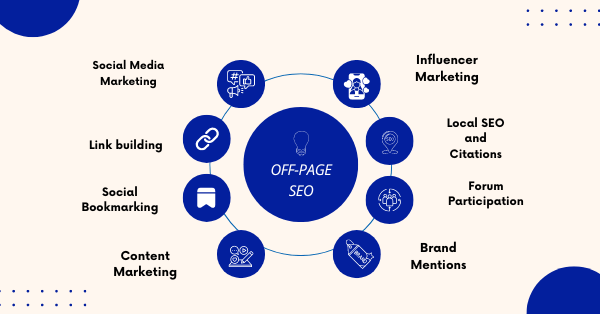Off-page SEO refers to the practice of activities done outside the website to increase its visibility online and to bring it up on the search engine results page (SERP). Unlike on-page SEO, It focuses on factors that occur off the website. Off-page SEO includes practices that would bring more visitors from various other websites, social media shares, and references by other reliable sources across the network.
Why does Off-Page SEO matter?
Off-page SEO is important to build a website’s reputation, reliability, and authority and to gain the trust of the visitors as well as the search engine platforms. Key reasons include:
Authority
A website with more quality references from different sources is more likely to be trusted and hence more authoritative.
Search rankings
Backlinks and social media engagement will lead to better search engine rankings.
Organic traffic
Higher rankings and social media reach will lead to more clicks and visits to your website, thus more traffic.
Brand awareness
Backlinks from different authoritative sources and brand mentions on different platforms, reviews, posts, and content will lead to brand recognition and will help in building reputation.
Hence this all shows its reliability and authority and hence can be trusted since it is referred to by other reliable and reputed sources. This would help in better ranking on the search engine results page (SERP).
Key steps of Off-Page SEO

1.Link building
Link building is the act of getting links or referrals from other websites. It can be a tough job, but it will surely help in making your site trustworthy and reliable. Creating backlinks means creating links that take you from one website to your website.
While creating backlinks, quality is more important than quantity. Thus, you should focus more on quality backlinks that are more reliable and trusted rather than more numbers of weak backlinks that are not so much “trusted”.
2.Social Media Marketing
Social media platforms play a good role in SEO, although indirectly. If you actively engage on social media channels, regularly posting, sharing, and gaining likes, it increases the chances of your brand visibility.
Social media marketing plays a vital role in promoting your brand and building your reputation. Thus driving more traffic on your website, and better ranking on search engines. A strong social media presence is a helpful off-page SEO practice.
3.Social Bookmarking
Social bookmarking is the practice of putting forward your website content on sites like Reddit, Digg, Pinterest, Tumblr, and so on. Additionally, like, share, and comment on relevant content along with your website mention and link, so they visit your website.
It can help in attracting more traffic and exposure. This would create backlinking to your website and therefore help in higher ranking in search engines.
4.Content Marketing
Users are always looking for informational, valuable, and engaging content. Producing high-quality content like blogs, articles, videos, images, and infographics can help you earn not only organic backlinks but also more visitors to your website.
This would show search engines that the content on your website shows Experience, Expertise, Authoritativeness, and Trust (E-E-A-T). So, the content of your webpage is an essential off-page element.
5.Brand Mentions
Brand mentions refer to the references of your brand on different websites, reviews, social media, forums, or other platforms. While there is no direct linking, still there is a positive impact of brand mentions.
Regular brand mentions help your website be visible to more users and build recognition. It builds trust in the eyes of users as well as search engines, thus better rankings.
6.Influencer Marketing
Promotion through influencers is one of the most advantageous and impactful SEO practices. Find influencers in your industry who have good followers and engage with them on social media, like and comment, and share their posts.
Work together on content and promotion of your brand, and product reviews. This will bring a positive impact in the eyes of the users and they tend to engage more with your brand. Search engines will also assess this for the results page ranking.
7.Local SEO and Citations
People are more likely to search for products and services available near them. Create your business profile on Google My Business, Bing, and Yelp. This helps search engines to identify your business and bring it before users. Keep updating your company’s location, contact details, and website information.
8.Forum Participation
Start participating in online discussions and forums. Join niche forums where you can find your industry-related content and provide your understanding and knowledge.
Further, engage in Q&A sites like Quora and Reddit and post your answers, brand mention, and link to your website. This helps bring your website before users and people interested in this niche and they are more likely to land up on your website.
Conclusion
Off-page SEO is the advertisement of the site. These practices would not only increase your website’s reach but also build a reputation in the eyes of both the users and the search engine. Consequently, this would make your website reliable, authoritative, and trustworthy. And search engines tend to place such sites on better ranking. Off-page SEO when carried together with on-page SEO, can help your website to perform better and higher on search engine results page (SERP). For more help, read more about on-page SEO.

